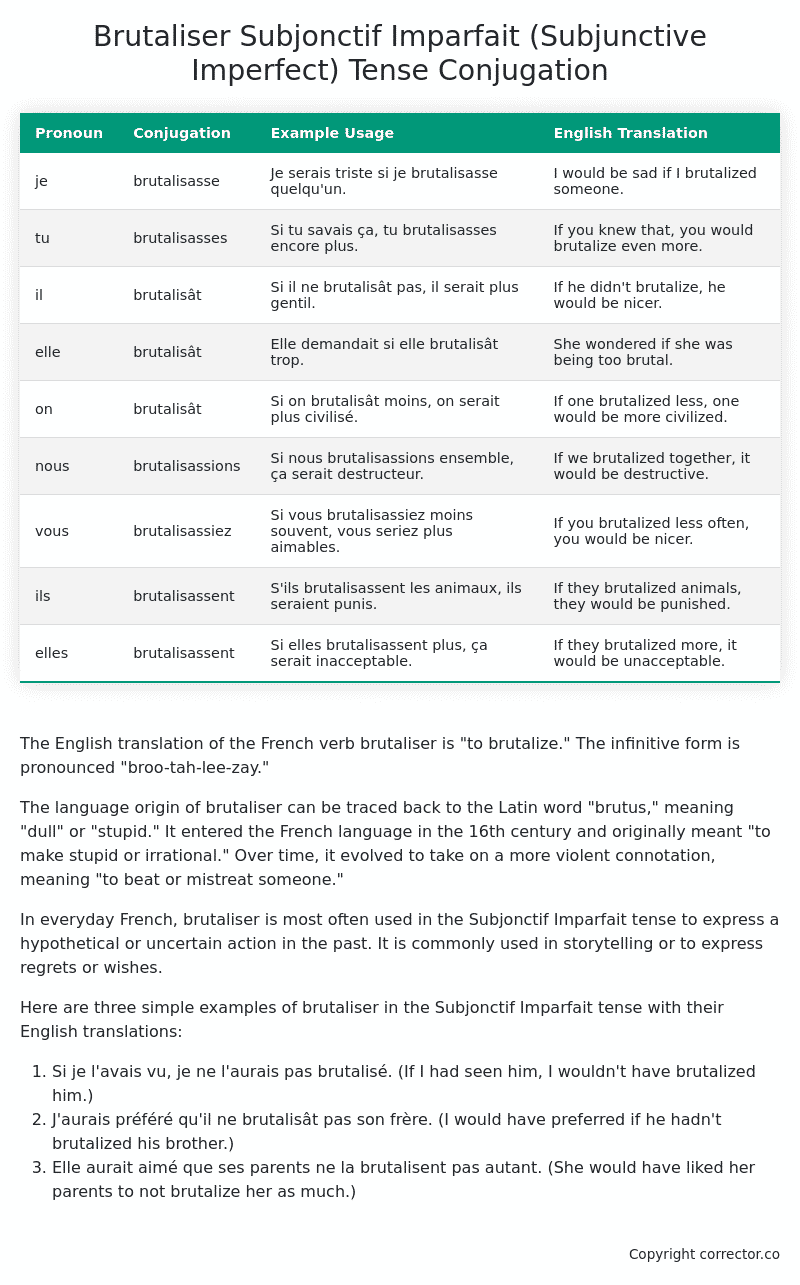Subjonctif Imparfait (Subjunctive Imperfect) Tense Conjugation of the French Verb brutaliser
Introduction to the verb brutaliser
The English translation of the French verb brutaliser is “to brutalize.” The infinitive form is pronounced “broo-tah-lee-zay.”
The language origin of brutaliser can be traced back to the Latin word “brutus,” meaning “dull” or “stupid.” It entered the French language in the 16th century and originally meant “to make stupid or irrational.” Over time, it evolved to take on a more violent connotation, meaning “to beat or mistreat someone.”
In everyday French, brutaliser is most often used in the Subjonctif Imparfait tense to express a hypothetical or uncertain action in the past. It is commonly used in storytelling or to express regrets or wishes.
Here are three simple examples of brutaliser in the Subjonctif Imparfait tense with their English translations:
- Si je l’avais vu, je ne l’aurais pas brutalisé. (If I had seen him, I wouldn’t have brutalized him.)
- J’aurais préféré qu’il ne brutalisât pas son frère. (I would have preferred if he hadn’t brutalized his brother.)
- Elle aurait aimé que ses parents ne la brutalisent pas autant. (She would have liked her parents to not brutalize her as much.)
Table of the Subjonctif Imparfait (Subjunctive Imperfect) Tense Conjugation of brutaliser
| Pronoun | Conjugation | Example Usage | English Translation |
|---|---|---|---|
| je | brutalisasse | Je serais triste si je brutalisasse quelqu’un. | I would be sad if I brutalized someone. |
| tu | brutalisasses | Si tu savais ça, tu brutalisasses encore plus. | If you knew that, you would brutalize even more. |
| il | brutalisât | Si il ne brutalisât pas, il serait plus gentil. | If he didn’t brutalize, he would be nicer. |
| elle | brutalisât | Elle demandait si elle brutalisât trop. | She wondered if she was being too brutal. |
| on | brutalisât | Si on brutalisât moins, on serait plus civilisé. | If one brutalized less, one would be more civilized. |
| nous | brutalisassions | Si nous brutalisassions ensemble, ça serait destructeur. | If we brutalized together, it would be destructive. |
| vous | brutalisassiez | Si vous brutalisassiez moins souvent, vous seriez plus aimables. | If you brutalized less often, you would be nicer. |
| ils | brutalisassent | S’ils brutalisassent les animaux, ils seraient punis. | If they brutalized animals, they would be punished. |
| elles | brutalisassent | Si elles brutalisassent plus, ça serait inacceptable. | If they brutalized more, it would be unacceptable. |
Other Conjugations for Brutaliser.
Le Present (Present Tense) Conjugation of the French Verb brutaliser
Imparfait (Imperfect) Tense Conjugation of the French Verb brutaliser
Passé Simple (Simple Past) Tense Conjugation of the French Verb brutaliser
Passé Composé (Present Perfect) Tense Conjugation of the French Verb brutaliser
Futur Simple (Simple Future) Tense Conjugation of the French Verb brutaliser
Futur Proche (Near Future) Tense Conjugation of the French Verb brutaliser
Plus-que-parfait (Pluperfect) Tense Conjugation of the French Verb brutaliser
Passé Antérieur (Past Anterior) Tense Conjugation of the French Verb brutaliser
Futur Antérieur (Future Anterior) Tense Conjugation of the French Verb brutaliser
Subjonctif Présent (Subjunctive Present) Tense Conjugation of the French Verb brutaliser
Subjonctif Passé (Subjunctive Past) Tense Conjugation of the French Verb brutaliser
Subjonctif Imparfait (Subjunctive Imperfect) Tense Conjugation of the French Verb brutaliser (this article)
Subjonctif Plus-que-parfait (Subjunctive Pluperfect) Tense Conjugation of the French Verb brutaliser
Conditionnel Présent (Conditional Present) Tense Conjugation of the French Verb brutaliser
Conditionnel Passé (Conditional Past) Tense Conjugation of the French Verb brutaliser
L’impératif Présent (Imperative Present) Tense Conjugation of the French Verb brutaliser
L’infinitif Présent (Infinitive Present) Tense Conjugation of the French Verb brutaliser
Struggling with French verbs or the language in general? Why not use our free French Grammar Checker – no registration required!
Get a FREE Download Study Sheet of this Conjugation 🔥
Simply right click the image below, click “save image” and get your free reference for the brutaliser Subjonctif Imparfait tense conjugation!

Brutaliser – About the French Subjonctif Imparfait (Subjunctive Imperfect) Tense
Formation
Common Everyday Usage Patterns
Interactions with Other Tenses
Subjonctif Présent
Indicatif Passé Composé
Conditional
Conditional Perfect
Summary
I hope you enjoyed this article on the verb brutaliser. Still in a learning mood? Check out another TOTALLY random French verb conjugation!


